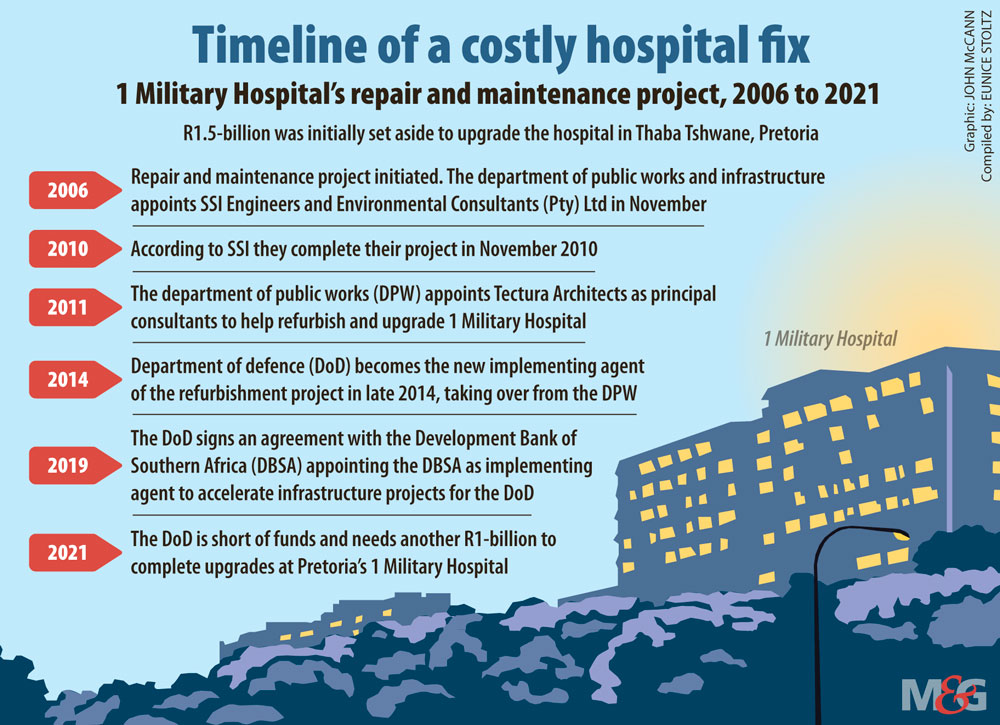1 Military Hospital. (Gallo)
Unauthorised and wasteful expenditure and the failure to follow procurement processes are only part of a lengthy list of misdemeanours covered in a forensic investigation into repair and maintenance work at the 1 Military Hospital at Thaba Tshwane, Pretoria, parliament heard this week.
Parliament was told in June that the department of defence had investigated construction work at the hospital and the report had been finalised. The department was told to return to parliament and present a detailed report on the matter.
The Mail & Guardian reported in August that 14 years of continued rotation of responsibility between the department of public works and the defence department to complete the 2006 refurbishment project had thwarted contractors and consultants working on the project.
On Thursday the defence department provided the portfolio committee on defence and military veterans details of the work done on the refurbishment project, as well as the budget and the time frame needed to complete it.
Defence secretary Sonto Kudjoe said she had received a 42-page executive summary of the investigation two days earlier. She confirmed that former South African National Defence Force chief General Solly Shoke had commissioned the investigation last year in June or July.
“What came out of the report was that there were officials both from the DOD [department of defence] side as well as the DPWI [department of public works] side that were mentioned,” Kudjoe said, adding that since the inception of the project in 2006 more than R1-billion was spent.
The report deals with matters relating to outsourcing and the change of the project’s scope over the years. It also highlights procurement processes that have not been followed, as well as unauthorised and wasteful expenditure.

“In the report it is not only about individuals, but also about some of the consulting firms,” Kudjoe said, referring to companies that were to work on first floor renovations, the theatre and the pharmacy.
She said while the outcome of the forensic investigation was pending it is “our dilemma as a department that it becomes difficult to continue with the first floor renovations when a part of those companies are implicated. I don’t think that it will serve us well if we continue with those that are implicated.”
The department of public works appointed Tectura Architects between 2011 and 2013 as the principal agent to refurbish and upgrade the first and second floors of the hospital.
When the defence department took over as implementing agents in 2014, Tectura Architects continued as the principal agent and received about R45-million over the years.
Cyril Xaba, the chairperson of the portfolio committee, told the defence department on Thursday that 1 Military Hospital had become “a milking cow” in that millions of rands were wasted on repeating work that had already been done over the years.
The defence department told the portfolio committee it would take another 29 months to complete the refurbishment project — but more funding was needed.
Drawing on information from 2019, the department said costs relating to construction on the first floor and related services were estimated at more than R567-million, and the cost of procuring medical equipment and furniture exceeded R839-million.
The portfolio committee said the costs of medical equipment might have increased over two years, resulting in the projected figure now possibly having doubled.
Deputy Defence Minister Thabang Makwetla said the money spent over the past 14 years “suggests that there was spending on the same work the previous executer [the department of public works] had spent money on. What worries me is that we are not talking of small figures; it is huge figures.”
Makwetla said officials at the defence department had not yet seen the full forensic report and requested that it be provided to them. The report is expected to be presented to parliament in the third week of September.